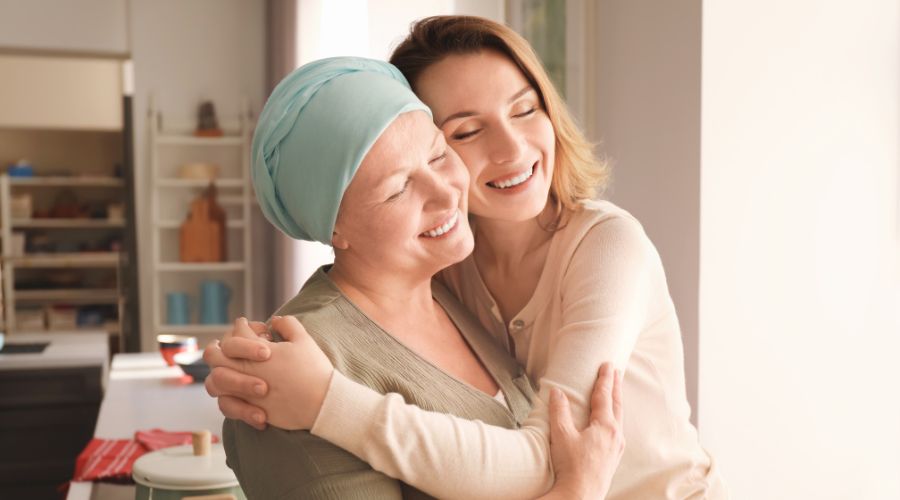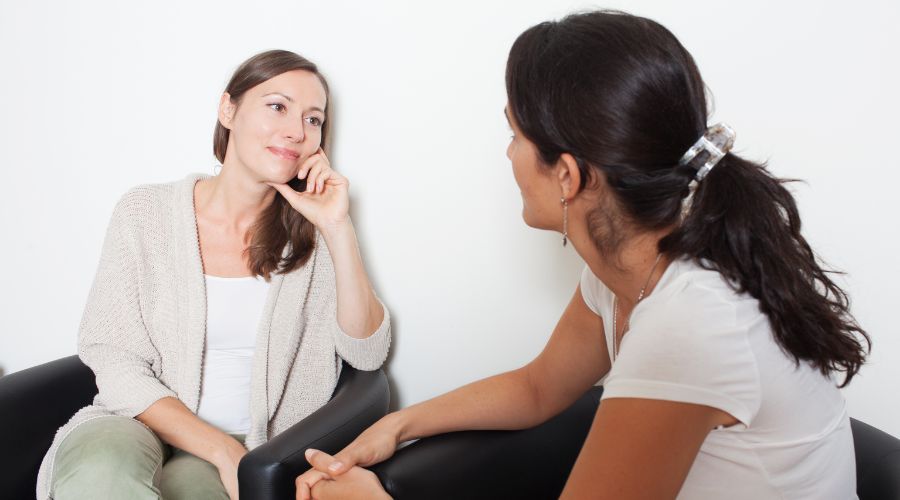Cancer can bring about lots of different feelings, for both the person diagnosed and the people in their life. Family and friends can be a lifeline for people with cancer who need support. Despite this, it can be difficult for others to talk to someone who has cancer.
Unless you’ve experienced the disease yourself, you won’t know how cancer patients feel. People may not intend to be hurtful, but may make inappropriate remarks as they don’t understand how to act.
Similarly, not knowing what to say can lead to people not saying anything at all. If you’re quite close to the cancer patient, you may feel uncomfortable about the experience and stay away from the person entirely.
This can create a wall between the cancer patient and their loved ones, but keeping contact is better than staying away. If you’re wondering how to talk to someone who has cancer, here are some tips to help you show your support.
1. Don’t Disappear
Some people who know someone with cancer choose to avoid, ignore, or disappear from the person’s life. This may be out of feeling uncomfortable with the situation, but this is one of the worst things you can do to someone living with cancer.
Social isolation is linked with cancer patients. The disease can be incredibly lonely for patients, especially if they have people who could act as their support network, but choose not to.
Something simple, like ‘I love you’, ‘I care about you’, or ‘I’m here for you’, can be helpful.
You can even tell the person that you’re not sure what to say! Just don’t disappear. Even staying silent and being by the person’s side is better than remaining distant.

2. Follow The Person’s Example
Allow the person with cancer to direct the tone of your meetings. Your conversations don’t always have to be about cancer. They might want to talk about regular topics or funny events that have happened. This can help cancer patients feel normal during an uncertain time.
Similarly, if the person wants to talk about cancer, let them. Give them a safe space to talk about their worries, but avoid giving them pitiful comments, as these are rarely helpful.
3. Think Twice Before Speaking
People can find cancer hard to understand if they haven’t gone through it themselves, but this may lead to inappropriate remarks. Every person with cancer will have a different experience, so don’t try and guess how they may be feeling.
Don’t use stereotypical language, like ‘battle’, or ‘warrior’. If the patient’s condition worsens, words like these imply that they didn’t ‘battle’ hard enough. Avoid being negative or mournful, but think about what you’d like people to say if you were going through the same experience.
4. Be There To Listen
You don’t need to keep speaking if you don’t feel like it. Just listening to the person can be enough. Allow the person with cancer to speak freely. Don’t interrupt them or comment on what they have to say, but be a friend by putting on your listening ears.
Your friend might not want to speak all of the time, so if they want to sit in silence, or put something on in the background, like music or a television show, this is okay. Company can make a world of difference, so as long as you’re by their side, you don’t need to say much to show your support.

5. Avoid Intrusive Questions
If you’re unsure about how to talk to someone who has cancer, remember that diagnosis is not grounds for intrusive questions.
Even if you want to know more about their condition or the disease itself, questions about their blood results or tumours are inappropriate. Trust that if your friend wants to talk about cancer side effects or medical appointments, they will.
Additionally, don’t ask the person private questions about this time. Topics like religious beliefs or personal life are best avoided unless the person brings them up themselves.
6. Don’t Compare
People who are diagnosed with cancer all deal with the experience differently. Though some things, like regular physical activity or healthy diets, may help patients, don’t compare the person to others who have made these lifestyle changes.
Telling the person about cancer patients who have kept going to work, ate particular diets, or kept to a strict physical regimen isn’t helpful. Don’t make predictions about their future or talk about ‘beating the odds’. If they feel like trying a certain diet, they will. Until then, let the person handle cancer however they wish.
7. Don’t Talk About Their Looks
Comments about looks are rarely helpful for those living with cancer, especially if the comments are pessimistic.
People may not wish to discuss their physical changes such as hair loss, change in weight, skin conditions, or side effects of treatments and medication.
Depending on the person, you may be able to tell them they look stronger, but only say this if you mean it. It’s best to refrain from talking about looks entirely and stick to general positive discussions.
8. Use Actions To Show You Care
People living with cancer need to know that they are loved. You can use words to tell them this, but actions show that you care.
Offer your help with household chores, like laundry, cooking, or getting to appointments. Make them a playlist of songs, a collection of magazines, or some of their favourite books to read.
Ask them clear-cut questions, like “When can I babysit the kids?”, or “When shall I bring round lunch?”. Don’t expect the person to give you something back in return, and only offer your assistance if you plan on seeing it through.
Remember that you don’t need to offer the world – just a hug can go a long way!

We hope this post helped explain how to talk to someone who has cancer.
How We Can Help
At The Bracken Trust, we offer community support for people living with cancer, including families, relatives, and carers who are affected by the diagnosis.
Our care centre provides advice and counselling to help families and patients manage the concerns linked with cancer. To find out more, call us on 01597 823646 or send us an email at nurse@brackentrust.org.uk



